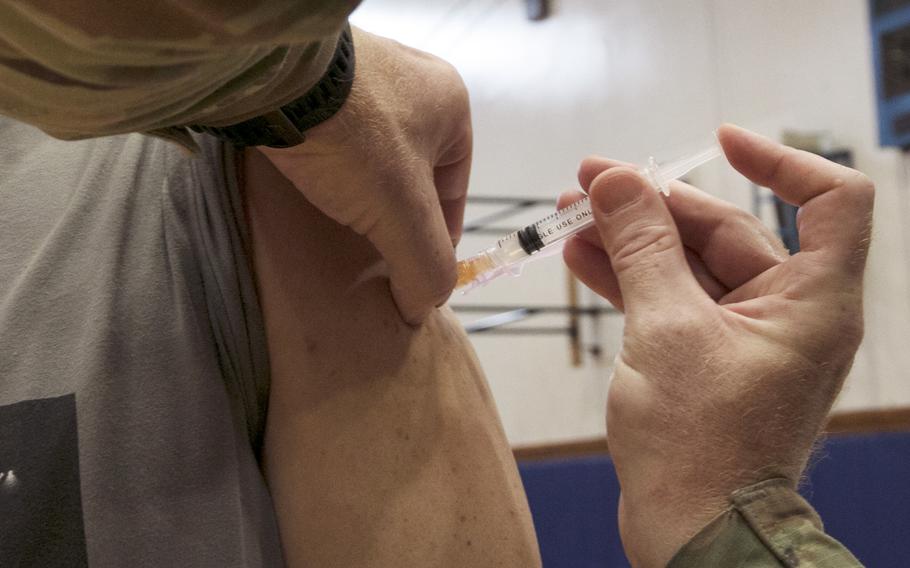Coronavirus
Moderna says its coronavirus vaccine is 93 percent effective six months after full vaccination
The Washington Post August 5, 2021

An Air Force medical technician injects the Moderna COVID-19 vaccine into a Japanese worker at Kadena Air Base, Okinawa June 16. (Matthew M. Burke/Stars and Stripes)
Vaccine maker Moderna said Thursday that protection from its coronavirus shots remained strong — 93 percent effective — six months after full vaccination.
The company also announced that it had tested three potential booster shots, which had demonstrated “robust antibody responses” and topped off immunity, bringing antibodies back to the protective levels triggered by full vaccination.
Pfizer-BioNTech made a similar announcement last week, stating that its vaccine remained 91 percent protective six months after the second dose. Both the Moderna and Pfizer-BioNTech vaccines are based on messenger RNA (mRNA) technology.
“We are pleased that our COVID-19 vaccine is showing durable efficacy,” Moderna Chief Executive Stéphane Bancel said in a statement. “But recognize that the Delta variant is a significant new threat so we must remain vigilant.”
Moderna’s vaccine was authorized for emergency use in adults in the United States in December and has since been cleared for emergency or conditional use in adults in more than 50 countries.
The announcement is encouraging news as the United States prepares to welcome back international travelers — when the time is right. A White House official told The Washington Post on Wednesday that the Biden administration is working on a plan to require nearly all incoming foreign travelers to be fully vaccinated against the coronavirus.
The Biden administration wants to reopen international travel, the official said. But after more than a year of barring non-U.S. travelers from dozens of countries including China, Britain, India and South Africa, no timeline has yet been announced.
Officials throughout the government are working on the policy “to be prepared for when the time is right to transition to this new system,” the official said. It would include a phased approach and require foreign nationals from all countries to be fully vaccinated, with limited exceptions.
White House press secretary Jen Psaki said last week that travel restrictions would remain in place “at this point” because of the delta variant.
The virus continues to rage across parts of the United States, largely due to the highly transmissible delta variant, as millions of Americans remain unvaccinated. The official said the United States is maintaining existing bans because of rising cases at home and abroad.
Bans on international travel to the United States due to the coronavirus were first put in place by President Donald Trump in early 2020. A similar approach was taken by many other countries including China, Chile and Australia, which all utilized border controls as a tool to keep the virus at bay.
The U.S. government under Biden has maintained a cautious approach to reopening foreign travel despite pressure from the U.S. airline and tourism industries to reopen travel with low-risk countries.
European lawmakers and business groups have also voiced criticism of the Biden administration for a lack of reciprocity. Vaccinated U.S. tourists have been allowed to return to much of Europe for weeks, while most Europeans continue to be unable to travel to the United States.
The United Kingdom announced last week that it would reopen its borders to fully vaccinated travelers from the United States and Europe. On Thursday, it further relaxed its quarantine requirements and increased the number of countries on its welcome list.
Canada has said it will begin allowing fully vaccinated American tourists into the country starting Aug. 9, after an unprecedented 16-month ban. Inoculated visitors from countries other than the United States will be permitted to enter from Sept. 7, Prime Minister Justin Trudeau said.
However, some countries are moving the other way. The Israeli Health Ministry said Tuesday it would require both vaccinated and unvaccinated Americans to quarantine for a week upon arrival, as Israel added the United States to a growing list of “red countries” to which Israeli residents were discouraged from traveling. The regulations are slated to take effect Aug. 11.
The United States still warns against travel to Israel and several European countries — among them Spain, Portugal and Cyprus — as the more contagious delta variant fuels coronavirus outbreaks, mostly among the unvaccinated. The Centers for Disease Control and Prevention and State Department advised Monday against travel to places including Greece, Ireland, Iran and the U.S. Virgin Islands due to rising cases.